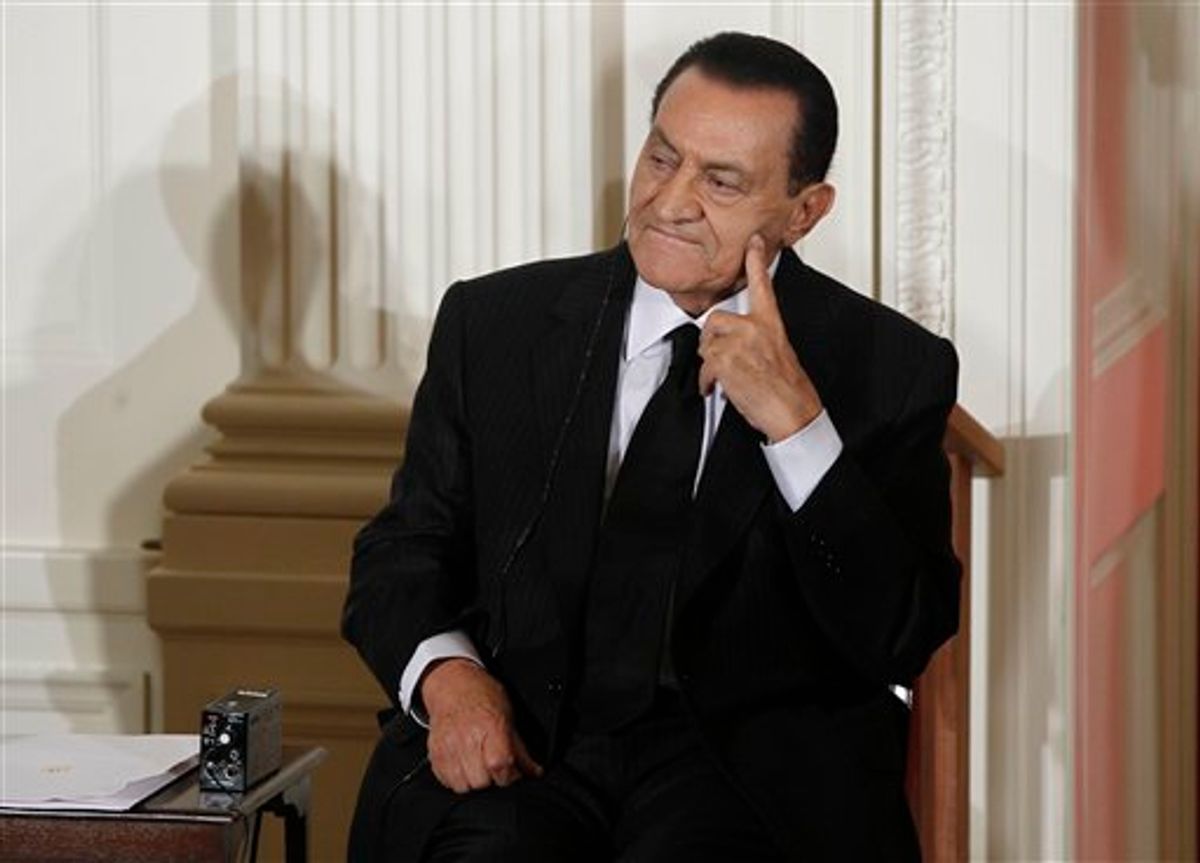Egypt's ex-President Hosni Mubarak will stand trial on charges of conspiring in the deadly shootings of protesters during the uprising that ousted him, the prosecutor-general said Tuesday, a major step in a country still rattled by protests and demands for justice.
The 83-year-old leader and his two sons also were charged with abusing power to amass wealth, enriching associates and accepting bribes, the prosecutor-general's office said in a statement. A date has not been set for the trial in criminal court.
Putting Mubarak on trial is a key demand of many Egyptians who have rallied to demand the ousted leader and his aides face justice. A close associate of Mubarak, Hussein Salem, also was charged. He is at large.
Mubarak stepped down on Feb. 11 and transferred power to the military after an 18-day popular uprising. At least 846 protesters were killed, according to a government fact-finding mission.
Mubarak has been in custody in a hospital in the Red Sea resort of Sharm el-Sheikh since last month. His two sons are in detention in a Cairo prison.
The Mubaraks and other members of the former regime have been the subject of legal efforts to bring them to trial since the ex-president was forced to resign on Feb. 11. Egypt's former security chief and four of his top aides are already on trial in the shooting of protesters.
Earlier this month, Tunisia's toppled president Zine El Abidine Ben Ali was charged along with his wife of inciting violence in the bloody crackdown on the popular uprising there. Ben Ali has fled to Saudi Arabia.
But after the initial euphoria in Egypt of a successful uprising, protesters have become impatient and stepped up demands that reforms and promises be carried out.
Mubarak's prosecution has been complicated by his health condition. He has been interrogated in the hospital, but an order by the prosecutor to transfer him to prison during the investigation was overturned on grounds the prison health facilities were not ready to receive him. He was never moved to a military hospital as suggested by the prosecutor.
Protesters took to the streets several times demanding a speedy trial for Mubarak and his sons.
The calls were aggravated two weeks ago by reports suggesting the military rulers might grant Mubarak amnesty. The reports sparked a wave of criticism and calls for mass rallies to demand justice. The anger prompted a quick denial from the military rulers.
The statement from prosecutor-general Mahmoud Abdel-Meguid on Tuesday accused Mubarak of having "conspired" with the former security chief and other officers to shoot and kill protesters who took to the streets starting Jan. 25. The decision comes ahead of a planned Friday protest dubbed "Egypt's second revolution," to demand Mubarak be put on trial and that all remnants of his regime be uprooted, including the hated emergency laws that remain on the books more than three months after his ouster.
Activist Hossam Hamalawi said the Friday protests will go ahead because there are other unmet demands besides trial for Mubarak. "It has to be a public trial, aired minute by minute," he said. "It is not a legal process as much as it is a political one."
Abdel-Meguid also charged Mubarak and his sons, Gamal and Alaa, with using their authority and power to enrich himself and business associate Salem.
Prosecution spokesman Adel al-Said said Mubarak's sons are still being interrogated on other accusations.
The prosecutor had earlier ordered the freezing of the assets of Mubarak and his family. His 70-year- old wife Suzanne was released after she relinquished assets and property valued at $4 million. The move aimed to settle corruption allegations against her, but it was unclear whether she would still face trial.



Shares